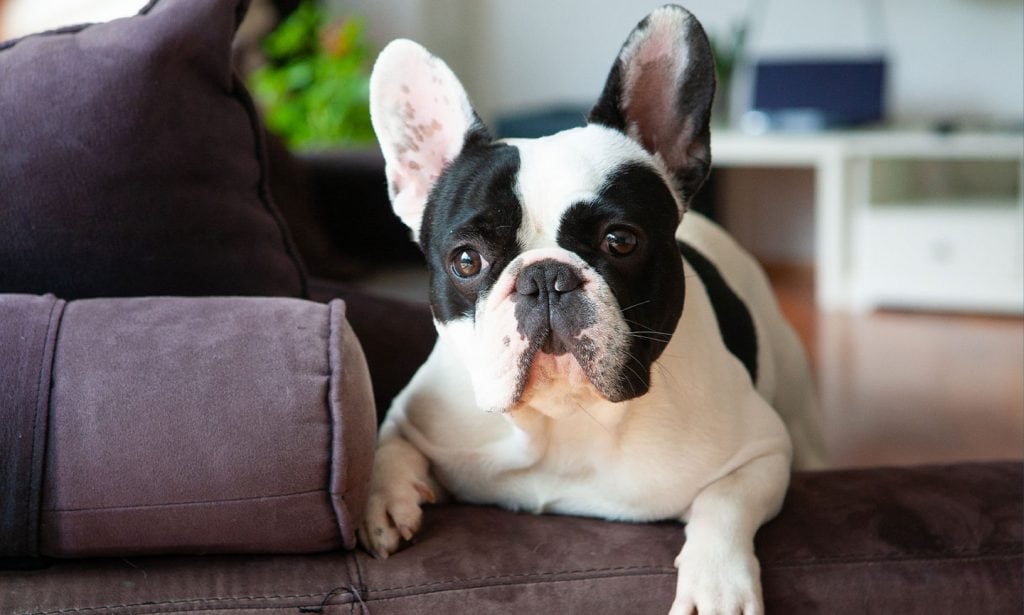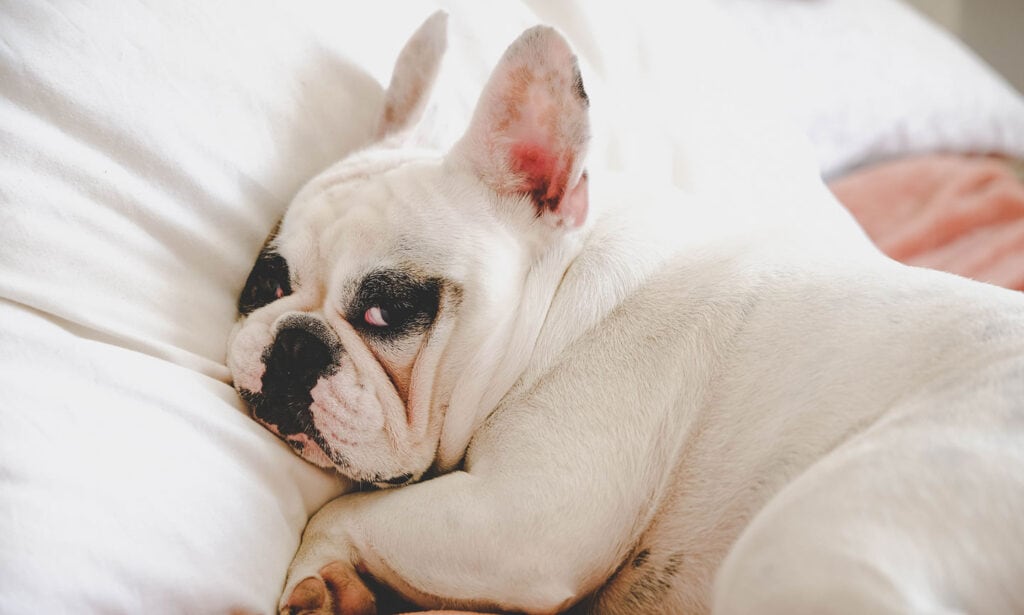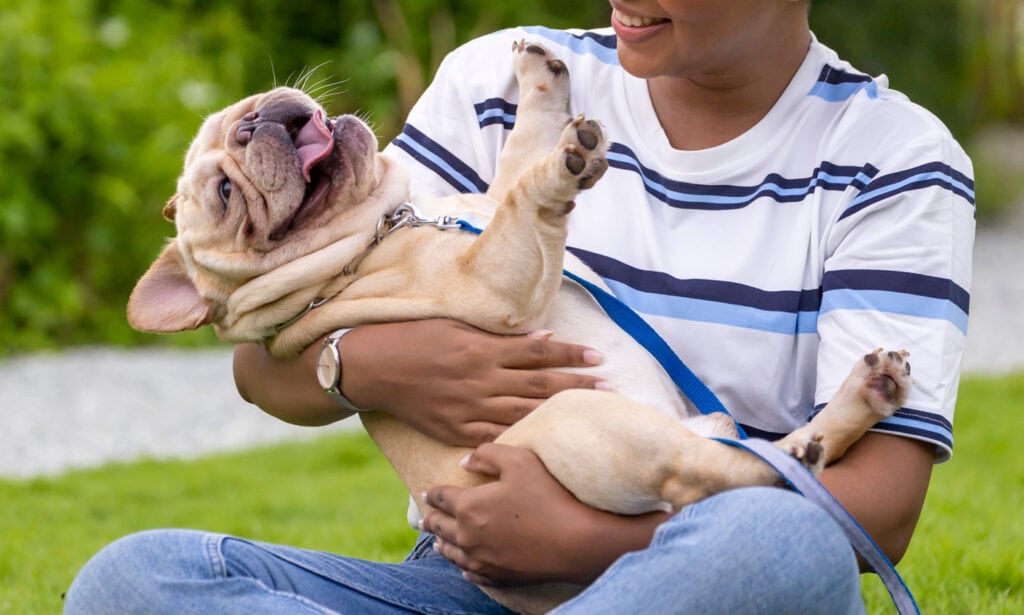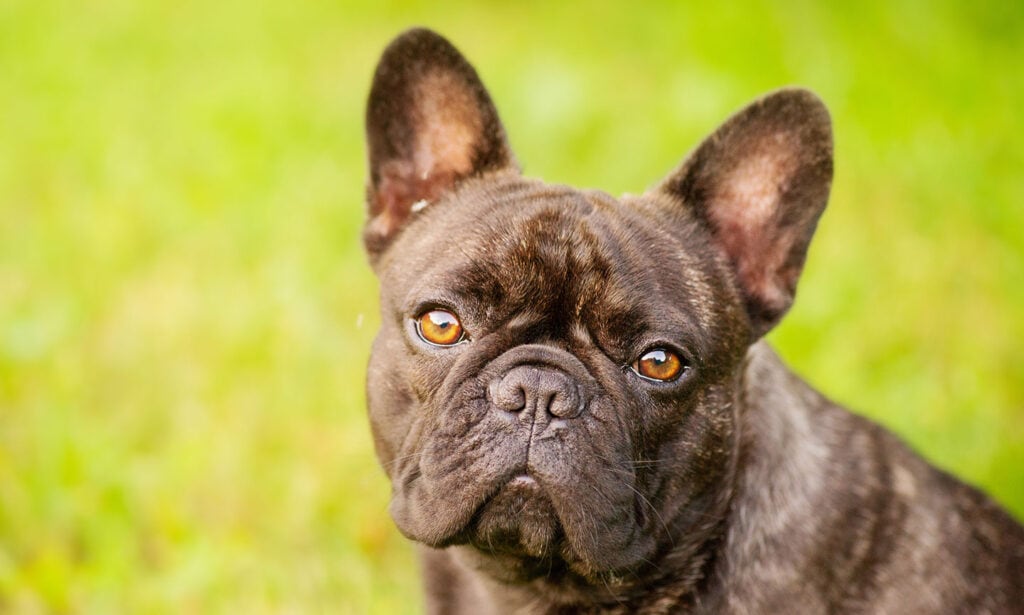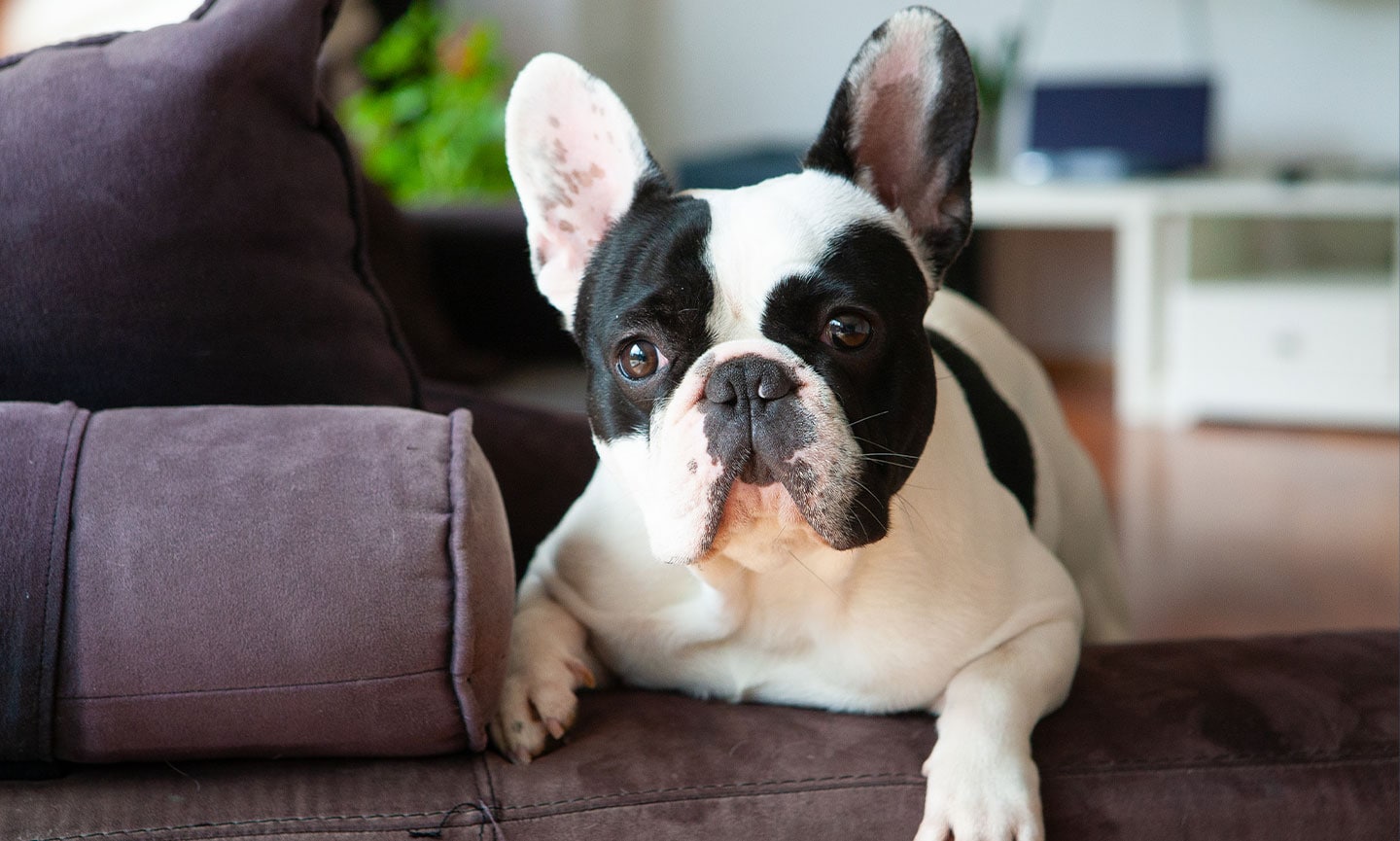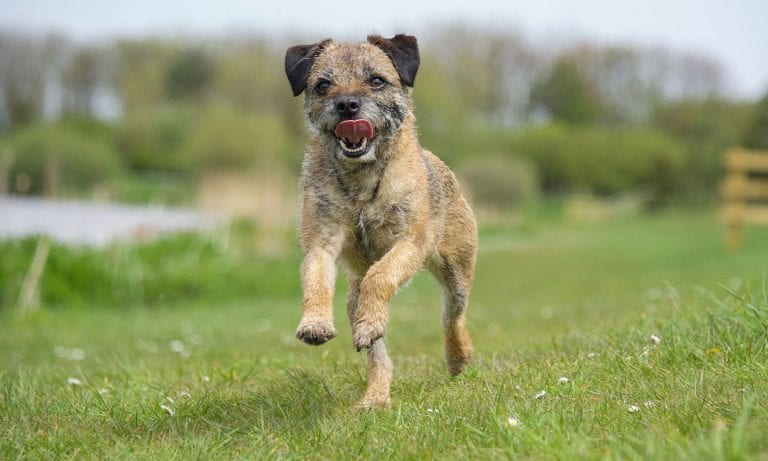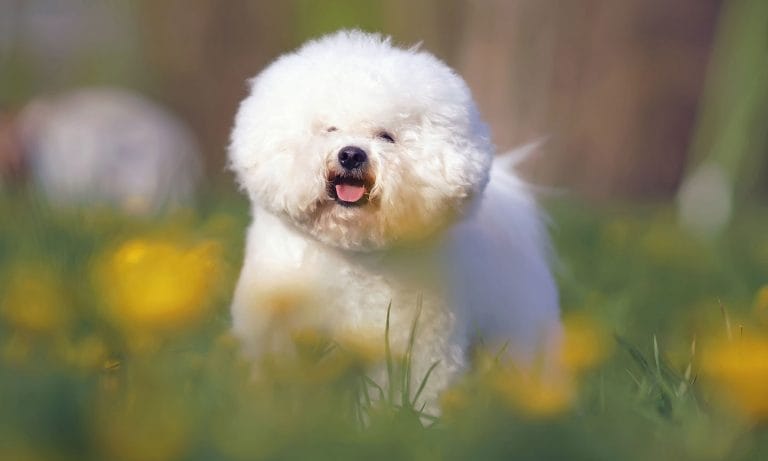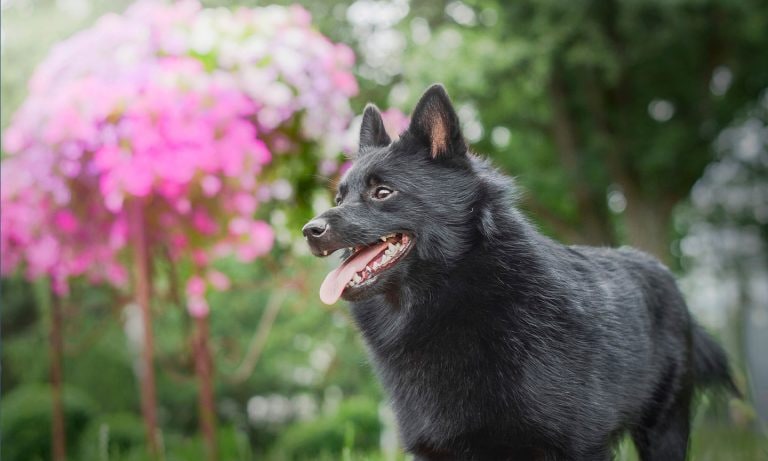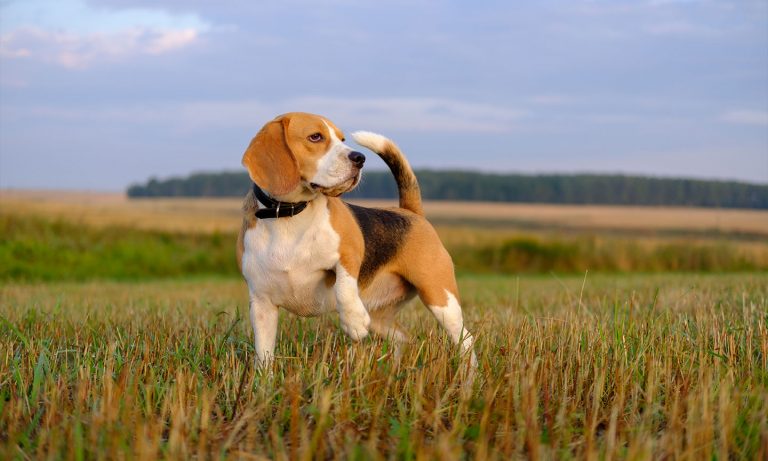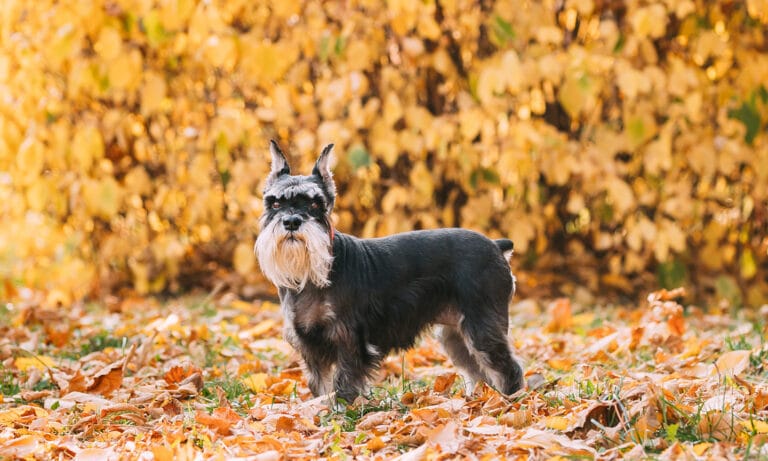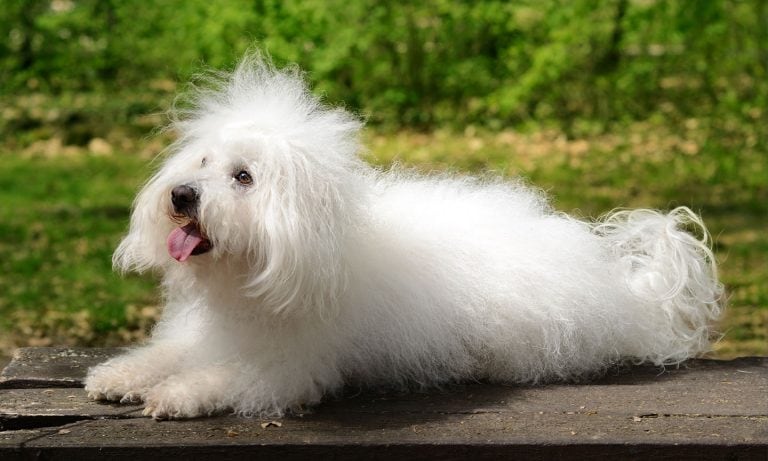A French Bulldog is the kind of friend who is always ready to hang out. A casual walk? Great! A lazy afternoon with Netflix set to autoplay? Fantastic! They’re up for whatever (as long as it’s not running a marathon). They’ll happily snooze the day away on a plush bed and convince you to do the same, but also love romping with dog friends and playing fetch. When you’re out on the town, prepare to be the center of attention—it’s inevitable with a bat-eared, smooshy-faced French Bulldog in tow.
Breed Snapshot
Temperament:
Bulldog AttitudeBest Friend For LifeExuberantCoat Color:
CreamFawnWhite
Best For
French Bulldogs, affectionate and adaptable, thrive on companionship. With a charming personality and lower exercise needs than many other breeds, they make ideal pets for apartment dwellers and families alike. Discover a delightful companion in the compact and lovable French Bulldog breed.
French Bulldog Temperament
They don’t call ’em bulldogs for nothing! French Bulldogs have a headstrong temperament—think of them as strong-willed. These small dogs think they’re big dogs, which is why it’s important for French Bulldog puppies to receive training and socialization early on. That will help them feel comfortable and friendly toward visitors (human or animal) who come to their home. Otherwise, they may be standoffish with strangers.
But make no mistake—French Bulldogs are friendly dogs who bond deeply with their people and love to have a good time. Because of those deep bonds, they can feel neglected and anxious when their people are out of the house for too long. If you’ve ever experienced missing someone even before they’re gone, then you can relate to how Frenchies feel.
Speaking of their people, the French Bulldog breed is good with kids and babies, but as with any dog, they should always be supervised and taught how to interact with dogs. They also get along with other dogs and cats, as long as you introduce them properly.
The French Bulldog is primarily a companion dog. You’re unlikely to see them helping first responders, but their unconditional affection makes them amazing emotional support and therapy dogs in hospitals and care homes. They also make good watch dogs, often barking if someone new is at the door.
How to Care for a French Bulldog
French Bulldogs are easy to have around. Sure, they need solid training ground rules, but they aim to please and their short coats are easy to brush. With the help of your veterinarian (and maybe a certified dog trainer to guide you along the way), you can successfully navigate your dog’s individual needs and personality.
French Bulldog Health
With good food and exercise (and common sense on your part), the French Bulldog lifespan is about 10 to 12 years. Unfortunately, they suffer from some health issues. Be aware of these concerns, so you can help your pup live a long, happy life.
- Allergies: Allergies are a common condition with French Bulldogs and can be caused by seasonal allergies (dust, pollen, mold) or food allergies. Allergies often show up as itchiness. If you suspect your pet has allergies, please schedule a visit with your veterinarian.
- Skin Infections: Those charming face wrinkles can trap bits of food and moisture (so gross!). Bacteria can multiply there, leading to skin infections. Keep infections at bay by cleaning your dog’s folds every day. If you see signs of infection (irritated, red, or swollen skin), visit your vet.
- Brachycephalic Obstructive Airway Syndrome (BOAS): One well-known Frenchie trait is their “snorting/snuffling/snoring” sounds; some pet parents even consider them endearing. While these noises may seem harmless, the fact is their physical attributes cause them health problems. Brachycephalic breeds (flat-faced dogs) may develop difficulty breathing during exercise because of the smooshed anatomy of their nostrils, airways and soft palettes. You can manage symptoms by keeping your dog at a healthy weight, but severe cases might require surgery.
- Ear Infections: French Bulldogs are somewhat prone to ear infections (their ear canals are narrow). If your dog suffers from frequent ear infections, your veterinarian can show you how to properly and safely clean the ears to help prevent future infections.
- Spine and Orthopedic Issues: Your French Bulldog may also be susceptible to common issues like intervertebral disc disease (IVDD), hip dysplasia and patellar luxation. IVDD is a disease of the spinal cord. Depending on the severity, pain meds or surgery can be used to treat the condition. Hip dysplasia is when the hip joint doesn’t fit properly. Treatment can range from weight management to physical therapy to surgery. Patellar luxation is a knee issue where the kneecap slips out. Keeping your pup at a healthy weight is your first line of defense; severe cases might require surgery.
- Eye Problems: The French Bulldog dog breed is susceptible to common eye issues, including cataracts and cherry eye. Cataracts, a cloudy lens, can cause blindness, but surgery can often correct it. Cherry eye is a condition when the third eyelid slips out of place and swells, which is also typically treated with surgery.
French Bulldog History
Here’s a surprise: The French Bulldog actually originated in England. They were developed as a smaller type of Bulldog (aka English Bulldog) and were popular with people in the lace-making industry in the 1800s. Gaining notoriety for their temperament in Nottingham, a center for lace-making, they became a bit of a lace-maker mascot. After the Industrial Revolution changed the lace-making industry, many lace-makers moved to France, where their diminutive bulldogs became fashionable. French artist Henri de Toulouse-Lautrec even included the French Bulldog in his art.
By the end of the 1800s, Americans began taking notice of the charming bat-eared dogs, and established the French Bull Dog Club of America in 1897. There was a bit of controversy regarding bat ears versus “rose ears,” which start upright, then fall to the side and back (the ear interior looks like a rose). American French Bulldog enthusiasts favored the bat ears, and as in France, the French Bulldog became fashionable in the United States, especially among socialites.
Following World War II, their popularity decreased, but experienced a steady rise until the 1960s and eventually surging in the 1990s. The breed catapulted (dog-apulted?) to the No. 2 spot on the American Kennel Club’s list of Most Popular Dog Breeds in 2020.
Considering a French Bulldog as a pet? Find a list of reputable French Bulldog breeders on the American Kennel Club’s website. Depending on the breeder, expect to spend anywhere from $1,500 to $5,000-plus for a pup. Be sure the breeder you buy from screens their dogs for health and temperament issues.
You can also reach out to French Bulldog rescues (find an organization via Chewy’s Shelter and Rescue Network) or keep an eye out for the breed at your local animal shelter, though know that you don’t often see the breed in multi-breed shelters, as most reputable French Bulldog breeders will take the dogs they sell back from families who no longer desire their pet. If you’re open to adopting a 3-4-year-old dog, reach out to local breeders and ask about their retired female dogs. Breeders often spay their females after two litters and then find them loving permanent homes.
FAQs
Are French Bulldogs hypoallergenic?
No, French Bulldogs aren’t hypoallergenic. French Bulldogs produce dander and saliva, and these, along with normal shedding, may trigger allergies in some people.
Are French Bulldogs smart?
French Bulldogs don’t rank at the top of canine intelligence charts. But they’re no dummies—they’re motivated by food and want to please their people, which helps with training.
Can French Bulldogs swim?
No, French Bulldogs can’t swim and should never be left alone near water. Their body structure and face shape make it difficult to keep their head above water, so outfit your Frenchie with an appropriately fitting doggy life vest whenever you’re near a pool, lake or other water source.
Boston Terrier vs. French Bulldog: What’s the difference?
Frenchies have a stockier and heavier body type, leaning toward the bully breeds, while Bostons lean more towards terriers and have a lighter bone structure.
Bostons are more energetic compared to Frenchies. They are agile and have a comparable temperament to Frenchies, and are similarly great with kids and other dogs. However, Bostons are generally more high-spirited than Frenchies. Read more about Boston Terriers here.
What are the top French Bulldog names?
Some of most popular French Bulldog names for girls—at least among Chewy customers—are Luna, Lucy, Olive, Bella, Lola and Daisy. Some of the most popular French Bulldog names for boys are Louie, Winston, Gus, Frankie, Milo and Stitch. For more name inspiration, check out our dog name guide.
What are the most common French Bulldog mixes?
- French Bulldog-Boston Terrier mix (Frenchton)
- French Bulldog-English Bulldog mix (Free-Lance Bulldog)
- French Bulldog-Dachshund mix (French Bull Weiner)
- French Bulldog-German Shepherd mix (Frenchie Shepherd)
- French Bulldog-Labrador Retriever mix (Frenchie Labrador)
Note: These are not purebred dogs but mixed breeds.
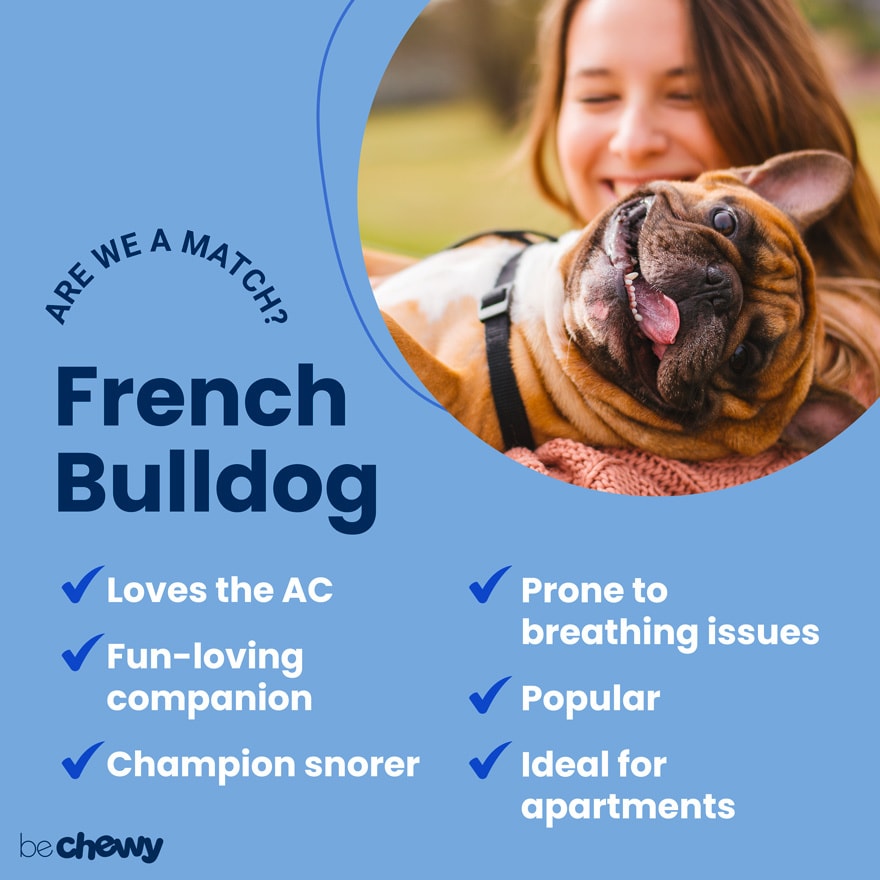
Top Takeaways
The popular French Bulldog is a likable, friendly, devoted companion who loves the people in their life. Sure, there may be the occasional health concern, a bit of grooming work and that Bulldog attitude, but nothing worthwhile in life ever comes without some effort. If you’re willing to put in the time, you can be sure your Frenchie will give you lots of love in return.
Expert input provided by veterinarian Dr. Margaret Hoffecker, DVM; certified trainer Liz Randall, CPDT-KA, of Dogs Abound, and Patty Sosa, board member of French Bull Dog Club of America, licensed AKC judge, and French Bulldog breeder of 38 years.
Breed characteristic ratings provided by veterinarian Dr. Sarah J. Wooten, DVM, CVJ, a veterinarian at Sheep Draw Veterinary Hospital in Greeley, Colorado; dog trainer and behavior consultant Irith Bloom, CPDT-KSA, CBCC-KA, CDBC, owner of The Sophisticated Dog, LLC, in Los Angeles; and certified animal behavior consultant Amy Shojai, CABC, in Sherman, Texas.
The health content was medically reviewed by Chewy vets.

Search for Adoptable French Bulldogs Near You
Female Names
- Luna
- Bella
- Lola
- Stella
- Coco
- Lucy
- Olive
- Daisy
- Zoey
- Nova
Male Names
- Louie
- Winston
- Milo
- Bruno
- Rocky
- Gus
- Frankie
- Stitch
- Loki
- Oliver
Share:
